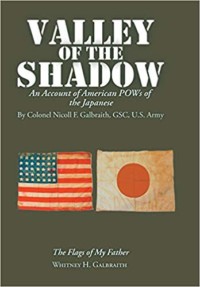Title: Valley of the Shadow: An Account of American POWs of the Japanese
Author: Whitney H. Galbraith
Publisher: XlibrisUS
ISBN: 978-1-9845-3593-1
Pages: 546
Genre: Non-Fiction
Reviewed by: Aaron Washington
Pacific Book Review
You have no doubt heard stories about the military when they are overseas for missions, and heard about prisoners of war. The stories are often told of brave men and women who defended the country in combat against armies from other nations. There is also the unfortunate side where soldiers get killed on the battlefield and others captured by the enemy. Valley of the Shadow: An Account of American POWS of the Japanese gives a detailed account of such events, telling passionate stories of soldiers and their role in national matters.
I was impressed that the book starts with a Psalm verse from the King James Version Bible. This verse is significant in that, the person saying or praying through the Psalm is assured that the Lord will not leave him, and will protect him during the tough times. This is important considering the stories being told later in the book are those which involve battles and wars.
The book tells the story of Col. Nicoll F. Galbraith, GSC, US Army, fellow prisoners of wars, and their Japanese captors. Every prisoner of war has his own tale. I thought it was very well done how Col. “Nick” Galbraith arranged his story. He explained the influence of religion vis-à-vis being in captivity, the orders of battle, personal discipline, shortcomings and the diet. Each prisoner of war had to devise a way of surviving. The period between their capture and rescue was dark. With just a little hope to hold on, the prisoners of war endured the most extreme situations. The Japanese were not kind to the Americans, to say the least.
For three and a half years, these soldiers had limited freedom. Their stories were told in a personal way, that all I could feel throughout was empathy. The accounts of the soldiers evoke emotions, and one can’t help but feel sad for what had happened to them. As much as the stories told were extreme in their cruelty, there are a few lessons one can learn from the book. One is that hope enables man to live on. With a little faith and spirit of persevering, one can break from whichever chains they are locked in. The other lesson is love for the country. The book enabled me to see how much work, effort and risk soldiers put in to protect the country. They are prone to a lot of dangers when fighting on foreign soil, but they still keep pushing because of their love for the country. It is noble to be patriotic, and unselfish in the most basic human way.
I would recommend this book to anyone who is interested in reading war stories and wants to read a non-fiction account, with detailed events, about being a POW. The writer did a fantastic job of compiling all the stories, as each soldier has a different way to cope with this dire situation. This book is a great read for a wide audience of soldiers, patriots and civilians alike, and should make it to everyone’s to-be-read list.


